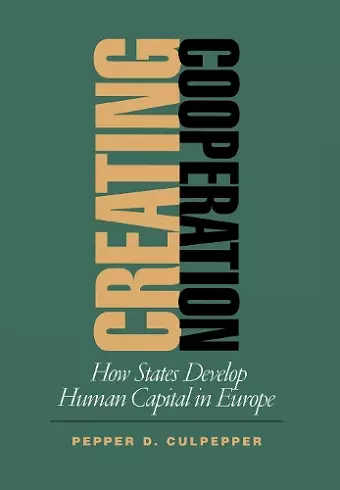Creating Cooperation
How States Develop Human Capital in Europe
Format:Hardback
Publisher:Cornell University Press
Published:17th Dec '02
Currently unavailable, and unfortunately no date known when it will be back

In Creating Cooperation, Pepper D. Culpepper explains the successes and failures of human capital reforms adopted by the French and German governments in the 1990s. Employers and employees both stand to gain from corporate investment in worker skills, but uncertainty and mutual distrust among companies doom many policy initiatives to failure. Higher skills benefit society as a whole, so national governments want to foster them. However, business firms often will not invest in training that makes their workers more attractive to other employers, even though they would prefer having better-skilled workers.Culpepper sees in European training programs a challenge typical of contemporary problems of public policy: success increasingly depends on the ability of governments to convince private actors to cooperate with each other. In the United States as in Europe, he argues, policy-makers can achieve this goal only by incorporating the insights of private information into public policy. Culpepper demonstrates that the lessons of decentralized cooperation extend to industrial and environmental policies. In the final chapter, he examines regional innovation programs in the United Kingdom and the clean-up of the Chesapeake Bay in the United States—a domestic problem that required the coordination of disparate agencies and stakeholders.
David Soskice and Peter Hall's agenda-setting edited volume Varieties of Capitalism appeared in 2001, and much of the work that appeared as chapters there is now beginning to appear as the first books of assistant professors. Pepper Culpepper's superb, theoretically literate, and empirically well researched comparative monograph is one of these.... Culpepper is a deeply learned and widely read scholar, very aware of the steps he is taking and, as a result, constantly stopping to address potential alternative explanations and challenges to his research design, empirical argument, and theoretical line of thought. I highly recommend Creating Cooperation to anyone interested in the problem of cooperation in general, rational choice versus constructivism in political economy, and the specific politics of human capital creation in contemporary Europe. This is a fascinating and bold book on many levels.
(Perspectives on Politics)This book deepens our understanding of how to foster what might be deemed 'positive' cooperation in public policy reform. This is a book that will appeal to those interested in the study of human capital policies in Europe and intrigued about the sources of social cooperation. It is a detailed, well-researched analysis that successfully illustrates why, as problems of decentralized cooperation arise across the industrialized world, we need to develop a more sophisticated understanding of the conditions that foster successful cooperative public policy.
- Paul Riseborough (EU Policy NetwISBN: 9780801440694
Dimensions: 235mm x 155mm x 22mm
Weight: 907g
277 pages